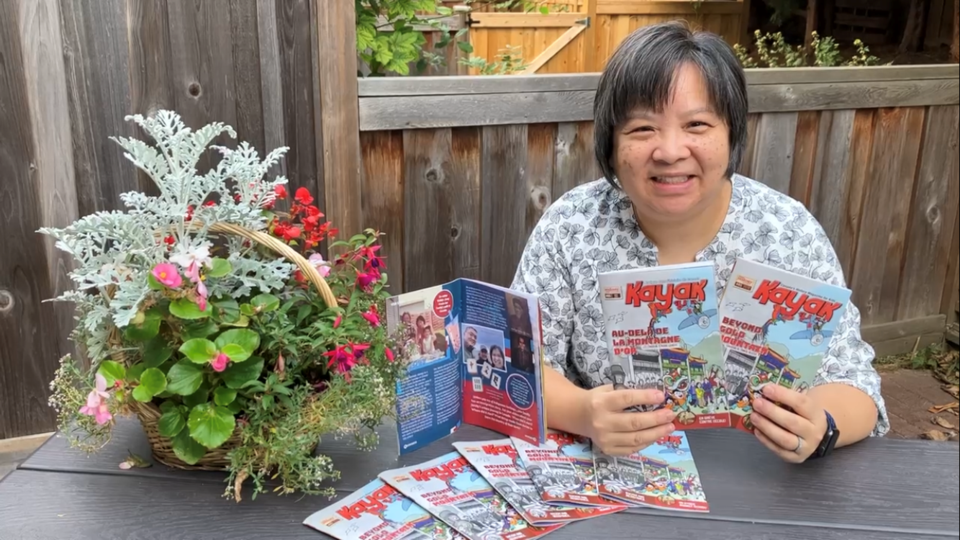A short-lived Chinese BBQ ban, the first Chinese Canadian doctor and a Victoria student strike against segregation are some lesser-known parts of Chinese Canadian history
These and other stories were highlighted in a recent children's magazine.
Debbie Jiang, Richmond author and teacher, is holding an author talk on Wednesday at the Brighouse branch of the Richmond Public Library to offer community members a behind-the-scenes look at her journey as a guest editor of the September 2023 edition of Kayak Magazine.
Jiang told the Richmond News she had one goal when tasked with guest-editing the magazine issue that commemorated the 100th anniversary of the Chinese Exclusion Act: to go beyond textbooks.
"As a teacher, I always found that the textbooks were just not enough. They won't report the real, day-to-day life stories of people," she said.
"It's always a set overview, and it's always the same photos."
Jiang explained textbooks "usually come from a biased perspective" and there are often stories left untold when members of visible minorities are not part of the publishing process.
"So that's what I like about the internet now, it's that kids who want to find out stuff for their heritage fair project, they don't need to stick to their textbook or even what their library offers," she said.
"The internet allows you to dig deeper than the average kid used to be able to dig (and) I think it's important to have these stories readily available."
Jiang's determination to dive deeper into Chinese Canadian history stemmed from her experience growing up as one of the few visible minority students in her school back in Ottawa.
"I remember in Ottawa thinking, 'Oh, I want to learn more about Chinese Canadians.' So I went to my public library, couldn't find a single book on the topic, and I was scratching my head, like, 'Why can I not find any information about my cultural past?'" she recalled.
Although information about Chinese culture might be easily accessible in Richmond and other parts of the Lower Mainland, she wanted to make it more readily available for kids in other parts of Canada, as well as those who were not aware of Canada's history of racism.
Untold stories often come from private collections
While putting together the magazine, Jiang channelled her passion for Chinese Canadian history and uncovered untold stories by scouring private collections and speaking with community members.
The result is a deep dive aimed at engaging younger audiences using both non-fiction content and fictional tales based on true stories, and featuring art by Chinese Canadian artists.
For example, Jiang crafted a fictional love story between a Chinese farmer and the daughter of a Musqueam landowner, based on Musqueam Elder Larry Grant's family history.
Jiang explained Chinese Canadians and Indigenous people shared the experience of being oppressed and marriages between the two communities were often common.
She included the story of how Chinese Canadians came to enlist in the Canadian army during the Second World War, based on her conversations with veterans in the past.
Photos in the magazine include the now-demolished Vancouver Immigration Building, also known as the Chinese Detention Shed, as well as a rare head tax certificate belonging to a woman named Mun Shee.
"I said, 'That's so weird to see a woman's head tax certificate. There's so few women who came. It was like 28 guys to one woman. That's how bad it was,'" Jiang explained.
She had spotted the certificate in her friend's photos of a museum exhibition in Montreal and managed to get in touch with the woman's granddaughter, who was proud to share her family's story with the community.
Not shying away from bad parts of history
Although the magazine caters to children, Jiang did not shy away from tougher topics of racism.
In "Unwanted," a feature story about discrimination against Chinese Canadians, Jiang included photos of metal tags worn by Chinese, Japanese and Indian employees at Fernridge Lumber Company based in Langley in 1910.
The tags contained only two pieces of information — a racial slur for the employee's race and a number.
Jiang explained the employees were only identified by their numbers rather than their names, and they had to wear the tags to get paid.
Rather than avoiding the topic, Jiang said teachers should approach it "sensitively" and let kids know the historical context of the slurs.
"So it's that kind of approach to teaching history — always with a caveat and always helping the young learner understand these are different times, and these are times that we don't wish to repeat because it's historical and we have moved on. Hopefully, we've become better people since that time," she explained.
As we mark the 100th anniversary of the 1924 mandatory federal registration for all Canadian-born children to Chinese immigrant parents and with a week left before Lunar New Year, Jiang wanted to engage Richmond community members in celebrating Chinese Canadian history.
Not only will participants get a behind-the-scenes look at how Jiang put the magazine together, they will also get to learn more about Chinese Canadian history that did not make it into print.
Each participant will get a copy of the magazine, and they will also get a chance to win prizes by answering a quiz.
For more information, visit the Richmond Public Library's event page for "Beyond Gold Mountain: Canadians of Chinese Descent."
Got an opinion on this story or any others in Richmond? Send us a letter or email your thoughts or story tips to [email protected].



